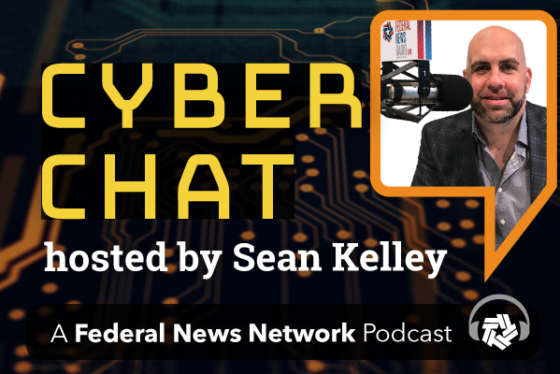Hubbard Radio Washington DC, LLC. All rights reserved. This website is not intended for users located within the European Economic Area.
On Air: Federal News Network
CYBER CHAT

FRIDAYS at 10:30 A.M.
A monthly show featuring interviews with experts in IT and Information Security discussing the latest trends and hottest cyber topics and challenges impacting the federal community. Follow Sean on Twitter. Subscribe on Apple Podcasts or Podcast One.
Related Stories
-
The future of federal cybersecurity CyberChat


Chinese economic theft
On this episode of CyberChat, host Sean Kelley, former EPA CISO, discusses the Chinese military’s for-profit ventures with Joshua Philipp, an investigative jo...
Best listening experience is on Chrome, Firefox or Safari. Subscribe to CyberChat with Sean Kelley on iTunes or PodcastOne.
China’s ongoing cyber war against the U.S. has been underway for decades. Intent on stealing intellectual property from private industry, China’s hacking and spying fuels its economic prosperity.
On this episode of CyberChat, host Sean Kelley, former EPA CISO, discusses the Chinese military’s for-profit ventures with Joshua Philipp, an investigative journalist at the Epoch Times, which covers national security and politics.
Join us May 2 at 2 p.m. ET for a discussion with agency and industry leaders on network modernization strategy, 5G, AI and plans for the future at the Naval Network Warfare Command and NASA, sponsored by T-Mobile. | Register now!
When it comes to war against the U.S., China, Iran, and Russia are key players.
“China is the most aggressive and largest player in this field. Russia is more of a distant enemy in this age. A lot of what China is using now are methods Russia used during the cold war,” Philipp said. He noted their tactics are laid out in Unrestricted Warfare, a book on military strategy written by Chinese generals. The book details methods of waging unconventional war through political action to cause policy changes, economic warfare or cyber attacks.
Philipp said China is also targeting the U.S. through forced technology transfer, the “stealing of technologies and using them to surpass the West or replace the West as the world leader.” The essence of technology transfer is to transfer knowledge, skills, methodologies and technologies from one company or country to another. “This type of trans-economic theft requires a lot more planning or systems in place to achieve the goal, or a hacker army,” said Philipp. He added that unit 61298, one of the 22 operational bureaus of the hacker army, focuses on waging warfare against American companies, organizations and government agencies.
Philipp also said China’s surveillance system uses supercomputing powers. “In the U.S., there are a lot of private companies collecting the data, but in China, everything is collected under one centralized system. The Chinese communist party has information on every purchase you make, who your friends are, what your beliefs are, what your ideologies are, facial recognition, where you are going. All of this information is collected to give you a social credit score, which determines what you can and can’t do. Your freedoms are determined how well you adhere to the social credit system,” said Philipp.
Top Takeaways
Copyright © 2024 Federal News Network. All rights reserved. This website is not intended for users located within the European Economic Area.
Related Stories
General Data Protection Regulation: an EU requirement?
Information Warfare: A handbook for weaponized minds
The future of federal cybersecurity